After the honorable Supreme court’s verdict on Sabarimala came, which stated that, “Woman is not lesser or inferior to man. Patriarchy of religion cannot be permitted to trump over faith. Biological or physiological reasons cannot be accepted in freedom for faith Religion is basically way of life however certain practices create incongruities,” on the question of women’s entry into the Sabarimala Temple. The honorable High Court of Kerala has given a rather shocking judgment which dismissed a petition seeking entry of women in mosques.
Akhila Bharata Hindu Mahasabha filed a PIL in the Kerala High Court seeking a directive to the central government for passing an order which would allow Muslim women to enter into mosques for offering prayers throughout the country. The petitioner, Swamy Dethathreya Sai Swaroop Nath who is the state president of Akhila Bharatha Hindu Maha Sabha, maintained that in the wake of recent judgment of Supreme Court allowing entry of women of all ages to enter into the Sabarimala Temple, this also calls for enabling entry of Muslim women into mosques for prayers along with men. In his plea, he further added, “Thus, women of Muslim community were being disgraced and discriminated against which was against Article 21 and 14 of the Constitution.”
Swamy Dethathreya Sai Swaroop Nath cited the example of Mecca where women were allowed entry and he made many other good points against the imposition of a dress code like purdah for Muslim women. The imposition would give a chance to anti-social elements to use it for their nefarious activities and committing heinous crimes, and such diktats also violate the personal liberty of women and is also not good for social security, as claimed by Swamy Dethathreya Sai Swaroop Nath.
However, the Honorable Kerala High court ended up dismissing the petition. According to the New Indian Express report, rejecting the petition, the division bench, comprising of Chief Justice Rishikesh Roy and A K Jayasankaran Nambiar observed that Muslim women have not raised the issue themselves. Had the Supreme Court used a similar logic, it should have dismissed the plea seeking lifting of the ban on the entry of women in the age group of 10-50 in the Lord Ayyappa temple in Sabarimala considering it was filed by Naushad Ahmed Khan, President of Indian Young Lawyers’ Association (IYLA). Later on, some other organizations too had filed public interest litigations (PILs) seeking to lift the age old practice.
Is this not ‘selective’ application of constitutional norms and bowing down to ‘tradition’? Isn’t it discrimination and unequal treatment? In its Sabarimala verdict, the apex court defined faith through modernistic lenses (equality, justice, liberty etc) and maintained that the right to equality is paramount in the constitution. However, in the Mosque case the Kerala High Court straightway rejected the petition demanding entry of women into mosques. The High Court’s decision to reject the plea of Akhila Bharatha Hindu Maha Sabha can therefore be thought of as a disregard of the precedent set by the SC vis-à-vis faith.
The Kerala High Court has dismissed the petition seeking entry of women in mosques at a time when NISA, a Kerala based Muslim women’s right group which is a progressive women’s forum, is also gearing up to approach to the Supreme Court, demanding the entry of women in all mosques across the nation. According to the Asian Age report, the group will seek permission for women to offer prayers in the mosques and also it will fight for getting women appointed as ‘imams’ (clerics). NISA president V P Zuhra said, “Like men, women also have the constitutional rights to offer worship according to their belief. So, like in Sabarimala, we want the entry of women in all mosques, cutting across denominations and establish their right to worship.”
Zuhra said at present Muslim women are allowed to offer prayers at mosques under Jamaat-e-Islami and Mujahid denominations, while the mosques which fall under predominant Sunni factions do not allow women to offer prayers inside the mosque premises. However, there is blatant segregation in the mosques even where women are allowed to offer prayers; there are separate entry and exit gates for worship reserved for men and women. Zuhra further said, “Our demand is to end this gender discrimination and allow Muslim women to pray in all mosques, cutting across denominations.” She further added that imposition of such restrictions is in violation of constitutional rights of women.
She also mentioned the point of Swamy Dethathreya Sai Swaroop Nath who cited the example of Mecca in his plea. Zuhra said, “There is no such gender discrimination to offer worship in Mecca, the holy city. The faithful, both men and women, together circle the Kaaba. Then why are the restrictions imposed on us in our mosques?” Many other Muslim women organizations are demanding the entry of women in all the mosques across the country but it feels as if the lawmakers are not aware or do not want to discuss this important and raging topic.
